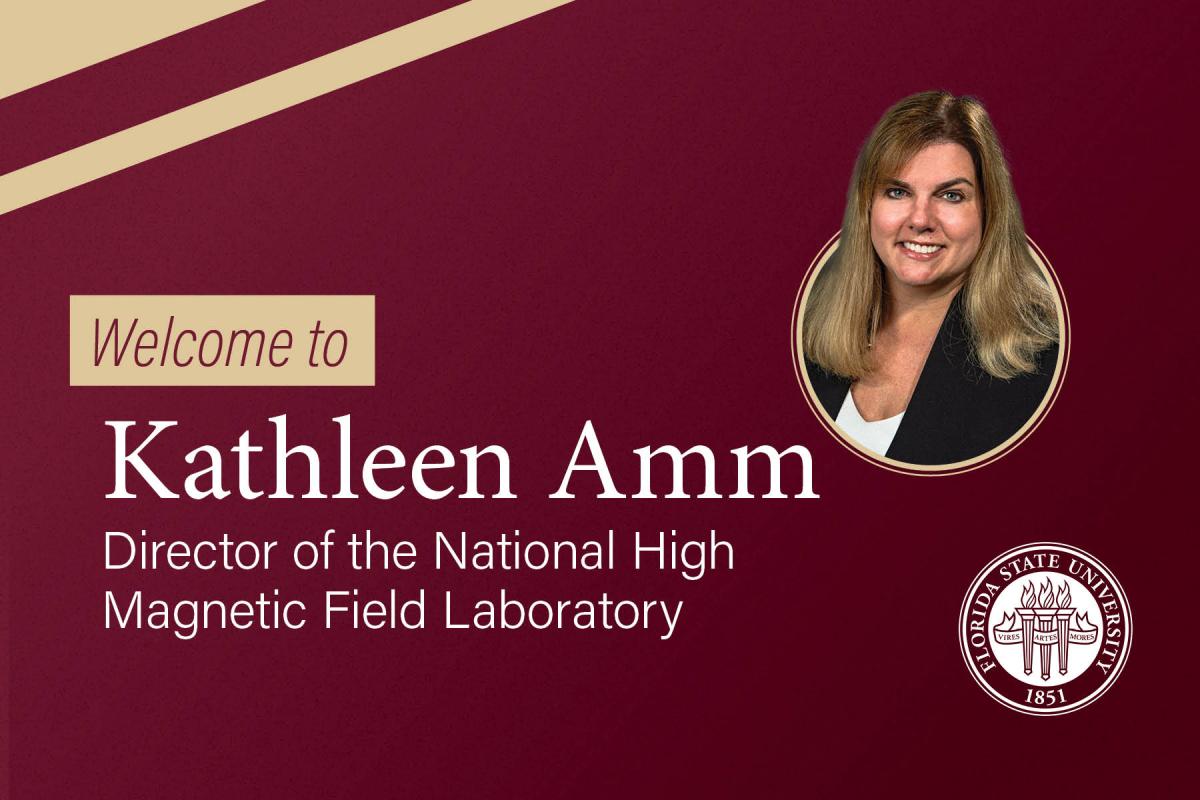Distinguished physicist Kathleen Amm named director of the National High Magnetic Field Laboratory

Florida State University has named acclaimed researcher and industry leader Kathleen Amm as the new director of the National High Magnetic Field Laboratory (National MagLab), the largest and highest-powered magnet laboratory in the world and the only facility of its kind in the United States.
Amm, who currently serves as director of the Magnet Division at Brookhaven National Laboratory, will begin her tenure as lab director on May 6. Selected as the result of an international search, Amm received her doctorate from FSU in 1998 and was advised by the National MagLab’s founding director, Jack Crow, during the early days of the formation of the National MagLab’s headquarters at Florida State University.
“We are delighted to welcome Dr. Amm back to Florida State University to lead the National High Magnetic Field Laboratory,” said FSU President Richard McCullough. “She has a proven record of success, and we are confident that her leadership, expertise and vision will usher in a new era of scientific excellence at the National MagLab.”
With primary funding from the U.S. National Science Foundation (NSF) and State of Florida, the National MagLab comprises more than 500,000 square feet at its Florida State University headquarters, plus locations at the University of Florida (UF) and Los Alamos National Laboratory (LANL). The National MagLab hosts researchers from hundreds of universities, labs and businesses from around the globe who use unique high-field magnets and instrumentation to answer pressing questions in health, energy, materials, quantum science and more.
Amm will oversee more than 500 scientists/employees and more than 2,000 visitors from across the United States and dozens of countries each year.
“I am elated to be returning to my alma mater to run the world’s largest and highest-powered magnet lab,” Amm said. “I believe the National MagLab’s people represent the lab’s greatest opportunity, and I am excited to work with the brilliant scientists and staff to develop a compelling vision for the future of high-field magnet science and technology.”
Amm will succeed current director Gregory Boebinger, who announced his intent to step down last year. Boebinger has elevated the National MagLab during his 20-year tenure as director and will remain at Florida State as a faculty member in physics.
“Dr. Amm brings decades of experience in high-field magnet research and development – both in industry and in a national lab setting,” said FSU Vice President for Research Stacey S. Patterson. “She will excel in this role and help realize the National MagLab and Florida State’s shared goals of advancing materials, building a resilient future and developing new health technologies.”
At Brookhaven National Laboratory, Amm leads a team of scientists, engineers and technicians developing the future of superconducting magnet technology.
Prior to Brookhaven, she spent nearly 20 years at GE Global Research, first as a physicist in the electromagnetics and superconductivity lab, before moving into various leadership positions across the organization.
Amm has a long track record of innovation in the field of magnet technology. She holds 22 patents and has co-authored more than 75 peer reviewed publications. In 2014, GE Global Research recognized her contributions to breakthrough magnet technologies. She is a member of several professional societies and senior member of the Institute of Electrical and Electronics Engineers.
As National MagLab director, she will oversee operations at the Florida State University headquarters and the lab’s satellite locations at the University of Florida and Los Alamos National Laboratory.
The University of Florida hosts two unique National MagLab user facilities for materials research and biochemical work. Ultra-low temperatures in a reduced electromagnetic noise environment are provided to probe quantum materials at temperatures near absolute zero (0.4mK) and powerful nuclear magnetic resonance and magnetic resonance imaging tools are available as part of the McKnight Brain Institute.
“UF welcomes Dr. Amm to the National MagLab,” said David Norton, vice president for Research at the University of Florida. “She brings extensive experience in complex projects and partnerships, and we look forward to her work with the unique research facilities that UF brings to the National MagLab portfolio.”
The Los Alamos National Laboratory hosts the National MagLab’s Pulsed Field Facility, which provides access to the world’s strongest pulsed fields, up to 100 tesla powered by a 1.4 gigawatt motor generator.
“Dr. Amm is a respected leader from a fellow Department of Energy-funded national lab (BNL),” said Ellen Cerreta, LANL’s associate laboratory director for physical sciences. “This new role directing the National MagLab is a continuation of her strong support in service to the nation’s highest scientific goals.”
The National High Magnetic Field Laboratory has been headquartered at Florida State University since 1994. Since that time, more than 25,000 researchers have conducted experiments from the National MagLab and the work done there has yielded more than 9,600 publications, over 200 book chapters and more than 100 patents.
The NSF announced a new five-year cooperative agreement in 2022 to support the National MagLab as one of its major facilities .
“The U.S. National Science Foundation is a proud supporter of the National MagLab and is excited to see the groundbreaking science discoveries and technological advances ahead during Dr. Amm’s tenure,” said Germano Iannacchione, director of the NSF’s Division of Materials Research, the steward of the National MagLab’s operation award.
For more information on the National MagLab, visit nationalmaglab.org.
